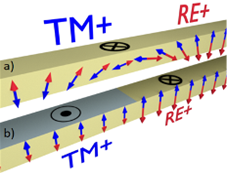Dnia 2021.11.23 (wtorek) o godzinie 13.15, odbędzie się wykład (seminarium odbędzie się „online” z wykorzystaniem platformy ZOOM) Wydziału Fizyki na którym dr hab. Piotr Kuswik, prof. IFM PAN, z Instytutu Fizyki Molekularnej PAN w Poznaniu wygłosi wykład pt.:
Serdecznie zapraszamy
Andrzej Maziewski
Jerzy Przeszowski
dr hab. Piotr Kuswik, prof. IFM PAN, z Instytutu Fizyki Molekularnej PAN w Poznaniu Artificial Magnetic Domains Without Domain Walls in Ferrimagnetic Tb/Co Multilayers Patterned by Ion Bombardment Ł. Frąckowiaka, F. Stobieckia, G.D. Chaves-O’Flynna, M. Urbaniaka, M. Matczakb, P. P. Michałowskic, A. Maziewskib, M. Reginkad, A. Ehresmannd, P. Kuświka a Institute of Molecular Physics, Polish Academy of Sciences, Smoluchowskiego 17, Poznań, Poland b Faculty of Physics, University of Białystok, Ciołkowskiego 1L, Białystok, Poland c Łukasiewicz Research Network - Institute of Microelectronics and Photonics, Aleja Lotników 32/46, Warsaw, Poland d Institute of Physics and Center for Interdisciplinary Nanostructure Science and Technology (CINSaT), University of Kassel, Heinrich-Plett-Str. 40, Kassel,Ion bombardment is known as a versatile technique for magnetic modification of ferromagnetic layered systems. It was demonstrated that this post-deposition method can be used to tailor locally magnetic properties (e.g., anisotropy, interlayer coupling, coercive field). This enables magnetic patterning of regularly arranged artificial domains in topographically flat films. For systems with perpendicular magnetic anisotropy this method are promising for applications in data storage technology (bit patterned media) or transport of individual magnetic particles. Here we present a new magnetic patterning approach to change magnetic properties of ferrimagnetic/sperimagnetic rare earth‑transition metal films, which recently has experienced a renaissance due to their multitude of applications (e.g. all-optical switching, current-induced magnetization switching with spin-orbit torque effect, creation and fast propagation of skyrmions).
 Figure 1: a) Domain wall (DW) between TM+ and RE+ areas with effective magnetizations directed downwards, b) magnetic domains without DW after switching of the TM+ area
Figure 1: a) Domain wall (DW) between TM+ and RE+ areas with effective magnetizations directed downwards, b) magnetic domains without DW after switching of the TM+ area
We show that the contribution of Tb sublattices to effective magnetic properties of perpendicularly magnetized Tb/Co multilayer can be tailored by 10-keV He+ ion bombardment. In this system, ion bombardment shifts the compensation point of the two magnetic subsystems towards a higher concentration of Tb. This type of modification enables local change of the domination from Tb+(RE+) to Co+(TM+) in systems that are Tb+ prior to the bombardment, which was used to to fabricate a 2D lattice of Co dominated (Co+) areas embedded in the Tb+ matrix. This pattern exhibits an interesting spin texture showing monodomain state of the effective magnetization after saturation together with domain walls between Co+ and Tb+ areas (Fig. 1a). After switching of the Co+ areas, a surprising magnetic configuration was obtained, in which adjacent magnetic domains with oppositely oriented effective magnetization exist without domain walls (Fig. 1b) [1]. This unique magnetic configuration is very stable due to a deep minimum in the energy of the system caused by flux closure and a corresponding reduction of the magnetostatic energy without an increase in energy by exchange and anisotropy terms across the walls. The presence of this type of magnetic spin texture strongly affects the magnetization reversal which will be analyzed with magnetooptical magnetometry and microscopy [2].
References [1] Ł. Frąckowiak, et al., Phys. Rev. Lett. 124 (2020) 047203. [2] Ł. Frąckowiak, et al., Sci. Rep. 11 (2021) 1041.W ramach naszego serwisu www stosujemy pliki cookies zapisywane na urządzeniu użytkownika w celu dostosowania zachowania serwisu do indywidualnych preferencji użytkownika oraz w celach statystycznych. Użytkownik ma możliwość samodzielnej zmiany ustawień dotyczących cookies w swojej przeglądarce internetowej. Więcej informacji można znaleźć w Polityce Prywatności Uniwersytetu w Białymstoku. Korzystając ze strony wyrażają Państwo zgodę na używanie plików cookies, zgodnie z ustawieniami przeglądarki.